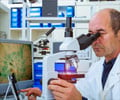A protein previously suspected in inhibiting DNA repair actually promotes it and prevents cancer, according to a study by researchers from the University of Texas M. D. Anderson Cancer Centre.
A protein previously suspected in inhibiting DNA repair actually promotes it and prevents cancer, according to a study by researchers from the University of Texas M. D. Anderson Cancer Centre.
The protein, HMGB1 has long been known to attach to sites of damaged DNA and was believed to prevent DNA repair."That did not make sense to us, because HMGB1 is a chromosomal protein that''s so abundant that it would be hard to imagine cell repair happening at all if that were the case," said Vasquez.
During the study, Vasquez and Sabine Lange, a doctoral candidate in the Graduate School of Biomedical Sciences analysed the protein''s impact on DNA restoration that includes access to damage, repair and repackaging of the original structure, a combination of DNA and histone proteins called chromatin.
First, they knocked out the gene mouse embryonic cells and then exposed cells to two types of DNA-damaging agents. One was UV light, the other a chemotherapy called psoralen that’s activated by exposure to darker, low frequency light known as UVA.
In both cases, the cells survived at a steeply lower rate after DNA damage than did normal cells.
Later they exposed HMGB1 knockout cells and normal cells to psoralen and assessed the rate of genetic mutation.
Advertisement
Knock out and normal cells were then exposed to UV light and suffered the same amount of damage. However, those with HMGB1 had two to three times the repair as those without.
Advertisement
However, HMGB1''s role in repair is crucial to drugs under development to block the protein, Vasquez said.
The protein also plays a role in inflammation, so it''s being targeted in drugs under development for rheumatoid arthritis and sepsis.
"Arthritis therapy involves long-term treatment," Vasquez said. "Our findings suggest that depleting this protein may leave patients more vulnerable to developing cancer."
The study appears online this week in the Proceedings of the National Academies of Science.
Source-ANI
RAS/L














